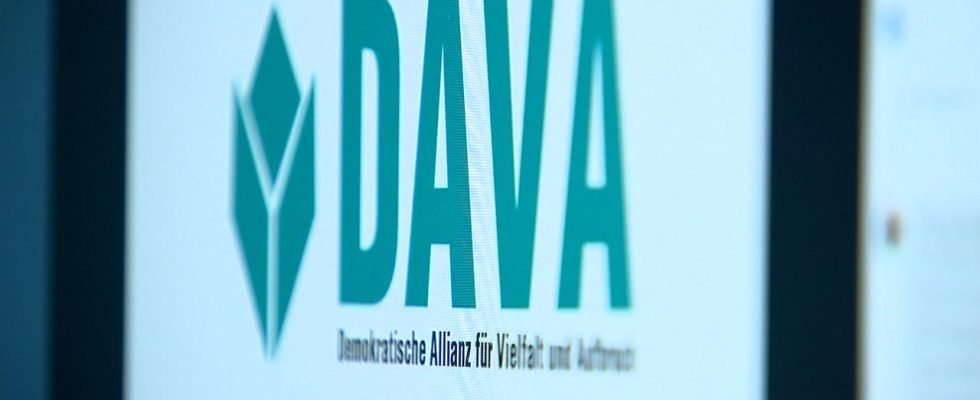A group of politicians of Turkish origin want to run in the European elections in Germany with a new party. How much influence does Turkish President Erdogan have in DAVA?
Since the chairman of the new Democratic Alliance for Diversity and Awakening, or DAVA for short, published a founding statement on Facebook on January 16th, there has been a hail of criticism. Many see DAVA as an offshoot of the Turkish ruling party AKP, the party of Turkish President Recep Tayyip Erdogan.
One of the leading figures of DAVA, founding member and number three on the party’s list, Mustafa Yoldas, strictly rejects any proximity to Erdogan: “We are not controlled by Mr. Erdogan, we are not financed by him. We are not the extended arm the AKP in Turkey,” Yoldas told the WDR. But there are certainly many people in DAVA who have sympathies for the AKP and Erdogan.
Just sympathies? Fatih Zingal is at number one on the list of the newly founded DAVA. For years he was an official of an association that promoted Erdogan’s policies in Germany and transported masses to the polls in buses.
There are numerous videos on social networks in which Zingal supports Erdogan. In a video from 2017, for example, he calls on a crowd at a meeting to support Erdogan as president.
Yoldas himself was an official of the Milli Görüs community for years, an organization of political Islam for which Erdogan also stands.
Doctor Mustafa Yoldaş is number three on the DAVA list.
Ministry of Interior is alarmed
The Federal Ministry of the Interior seems to be alarmed. In writing it is stated: “Any attempts to influence an election in Germany from outside will not be tolerated.”
A fear that experts also have. Erdogan is interested in influencing Muslim migrants in Germany, says Hüseyin Cicek, political scientist and Erdogan expert at the University of Bonn.
It’s about “generally portraying the Muslims here in Germany as a minority that is at risk, that has been forgotten by the German system and that is not being taken into account by German politicians.” This is “classic populism,” said Cicek.
Harmless alliance or Erdogan Advocacy?
Mustafa Yoldas from DAVA, however, asserts that the party wants to ensure that “people from the immigrant community who have different ethnic and religious backgrounds” are given their rights in full and are “adequately represented”.
“Their opinions, wishes, dreams” are not represented by the established parties, said Yoldas. He sees the new party “at the center of society.” So is DAVA just a harmless association that represents the interests of Muslim migrants in Germany? Or is it about representing Erdogan’s interests?
Turkish opposition politician warns
Mustafa Yeneroglu knows many of the leading DAVA minds from ancient times. The German-Turkish lawyer stood side by side with Fatih Zingal in the Erdogan lobby organization UETD, now renamed UID, and defended Erdogan’s policies on German television.
Today he is a member of the opposition party DEVA in the Turkish parliament and has put a clear line under his political past. He could imagine that “some in this party are less seeking attention in Germany than Erdogan’s favor in Turkey.”
According to Yeneroglu, he generally thinks little of minority parties. They would not be able to “exercise solution-oriented influence on politics.”
Yeneroglu pleads with German-Turks not to get involved in DAVA. The right way is to get involved in the “established, larger parties of the democratic center” for the interests of your own minority. Otherwise you would contribute to the division of society.
A political vacuum
The problem: DAVA is currently running into a political vacuum, says Yeneroglu. DAVA primarily targets Muslims with a German passport; not just from Turkey. It could therefore have great potential for voters – especially among those who do not yet feel represented by German parties.
Yoldas from DAVA thinks that the established parties have to answer the following question: “How does President Erdogan manage to bring 40,000 people of Turkish origin together on the Rhine when he comes to Germany? And why doesn’t Olaf Scholz manage 4,000 people with a Turkish background?” A lot has been missed in integration policy in the past decades.
Theoretically, after the change in citizenship law, there will be a potential voter potential of around five million people in the future. But there are also many Muslims who do not see themselves as religious. And not every religious Muslim is a supporter of Erdogan.
DAVA wants to take part in the European elections in June. Certainly under close observation, especially when it comes to Erdogan’s influence. It’s hard to say how many voters she can actually mobilize.

